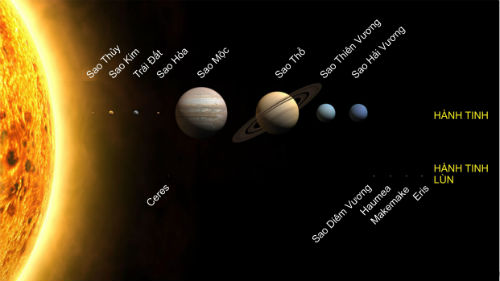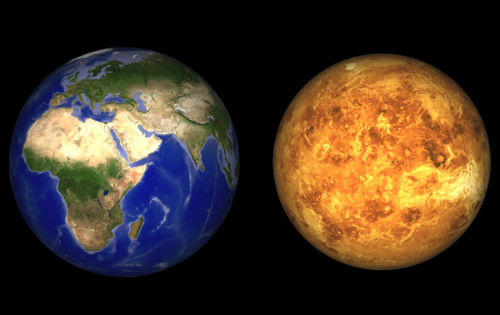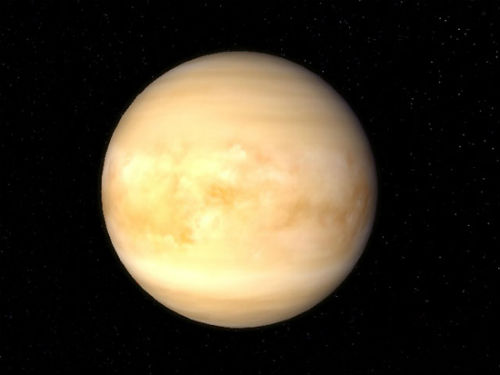The mystery of Venus
Venus - the destination of Colombo Bepi spacecraft is a planet with many mysteries that people need to study to understand the phenomena and warming of the Earth climate.
Venus is the brightest planet in the Solar System after the Moon and Sun. Compared to Earth, it is the first star to appear at night and disappear at dawn at last.
Venus is the second planet from the Sun in our solar system and is named after Roman god of love and beauty - Venus.
Venus is also known as the name Star or Morning Star.
Venus is one of the brightest objects in the sky, so it is often mistaken for an unidentified flying object (UFO).

The position of Venus in the Solar System
Considered by astronomers as Earth's twin sisters , Venus has many similarities with our planet: both are made of stone, with nearly the same size and shape. Venus is the closest planet to Earth and is closer to the Sun than Earth . However, there are many differences between Earth and Venus, especially their formation.
Venus's diameter is 12,092km (less than 650km of Earth) and its mass is 81.5% of Earth's mass.

Venus has a mass and size smaller than Earth
Venus turns very slowly : 1 day on Venus equals 224.7 days in Earth. Venus revolves around the Sun for 225 days (365 days for Earth).

Images with real colors of Venus
The study of the terrain and measurement of Venus's surface was done by many Russian and American spacecraft. The data show that the planet was formed more than 4 billion years ago but the surface is relatively young, only 500 million years. Therefore, astronomers ask whether the volcanoes on this planet are still active?
Venus is the only planet in the Solar System that rotates against the clockwise direction . Venus spins from East to West, while all other planets rotate in the opposite direction (from West to East).
In other words, in Venus, the Sun rises in the West and sets in the East.

The atmosphere is dense in Venus
On Venus, at a height of 60 km, the wind blows at a speed of 400 km / h.The dense atmosphere creates a greenhouse effect that makes the planet extremely hot. At an altitude of about 80 km, there is an element that absorbs all ultraviolet rays from the Sun and this is still a mystery to scientists.

The average temperature in Venus is 462 degrees Celsius
With an average surface temperature of 462 ° C, Venus is the hottest planet in the Solar System. Some scientists have suggested that Venus has had oceans in the past, but evaporated when the planet's temperature increased due to the uncontrolled greenhouse effect.
The entire surface of Venus is an arid desert with rocks and dust and probably still active volcanoes on the planet.

80% of Venus's surface is flat volcanic plain
About 80% of Venus's surface is covered by flat volcanic plains, or 70% of the plain has ridges and 10% of lobes plain.
The total mass of carbon dioxide surrounding Venus accounts for 96.5% of the atmospheric mass, and the majority of the remaining mass is 3.5% of nitrogen.

On the surface of Venus, there are a lot of impact holes
On the surface of Venus, there are a lot of impact holes. According to astronomers, there are more than 1,000 impact craters distributed throughout the Venusian surface. And 85% of the impact crater is still in its original state.
The impact craters on Venus have a diameter of 3 km to 280 km. There are no holes with a diameter less than 3 km.
The atmospheric pressure on Venus is 92 times greater than on Earth.

Bepi Colombo train
The Soviet Union's Venera 3 is the first artificial probe to land on Venus in 1966.
The European Space Agency (ESA) is implementing a plan to launch an orbiter ship on Mercury 2014, the Bepi Colombo vessel , and it will carry out two flights over Venus before entering orbit Mercury in 2020. .
The Egyptians believed that the universe had 2 Venus. Because Venus reached its brightest point at the time of the setting of the Sun and before dawn, so the ancient Egyptians believed that the planet was essentially two different objects. They call Venus with two names: Tioumoutiri - the morning star and Ouaiti - the night star.
- Overview of Venus
- Venus can stay?
- NASA wants to bring people to Venus
- Venus Experss are about to plunge into the Venusian atmosphere
- Venus is about to be a
- After 8 years of Venus exploration, Venus Express has run out of fuel
- 10 most interesting things about Venus
- Plan to conquer human Venus
- The ocean may exist on Venus on Earth about 700 million years ago
- Video: Unusual midnight in hell Venus
- Venus has volcanic eruptions
- Decode the mystery that makes Venus look bigger than Jupiter
 Van Allen's belt and evidence that the Apollo 11 mission to the Moon was myth
Van Allen's belt and evidence that the Apollo 11 mission to the Moon was myth The levels of civilization in the universe (Kardashev scale)
The levels of civilization in the universe (Kardashev scale) Today Mars, the sun and the Earth are aligned
Today Mars, the sun and the Earth are aligned The Amazon owner announced a secret plan to build a space base for thousands of people
The Amazon owner announced a secret plan to build a space base for thousands of people